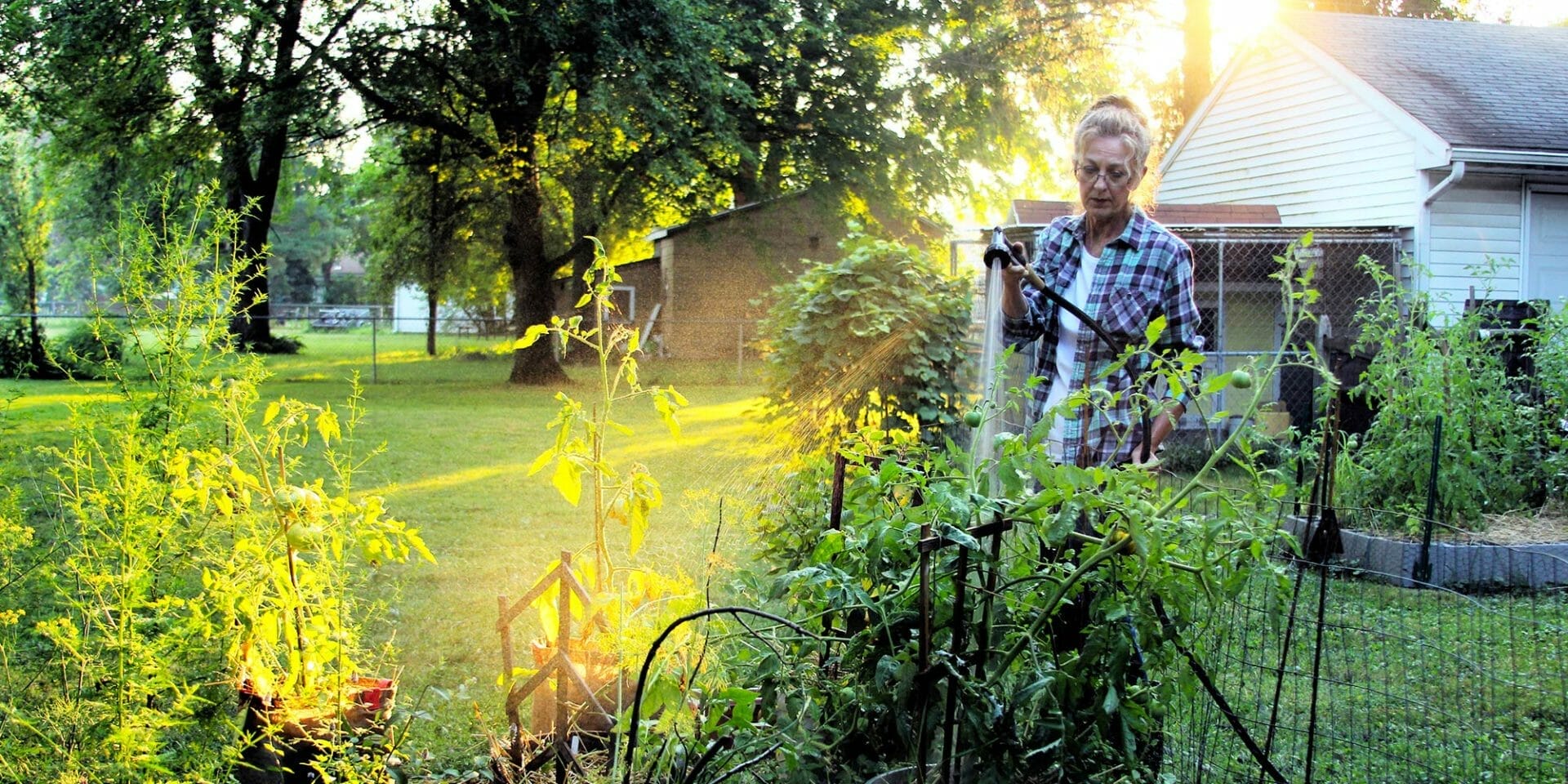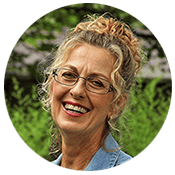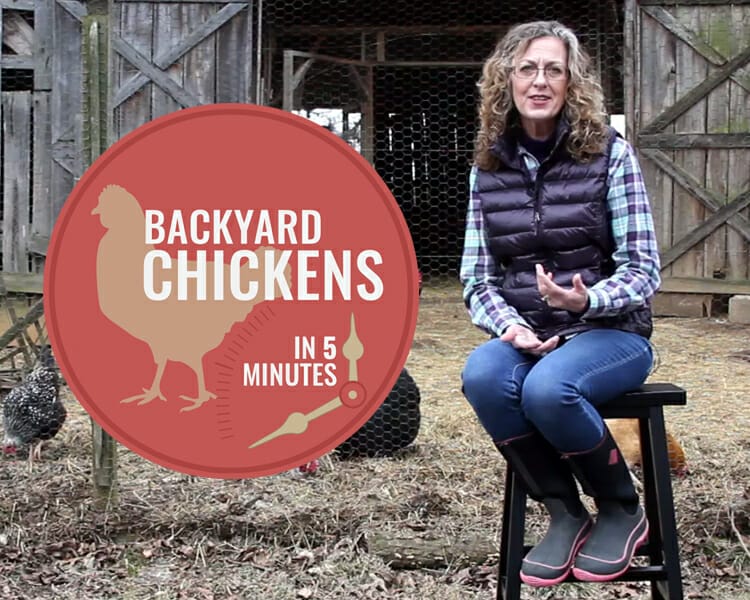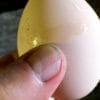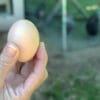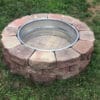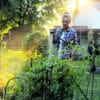For some time now, I have felt a call to “Go back to the Garden.”
It’s a constant nudge in my heart, a yearning I can’t escape.
At first, I didn’t have a very clear picture of what “Go back to the Garden” really meant to me; I just knew I felt something.
But as I thought about what I see happening in our world — to our food, to our pace of life, to our values…
that feeling began to take shape, like the focusing of a camera lens.
Are We Really Living?
Modern life is bigger, faster and more hectic than we humans can (and should have to) manage. For many of us, our kids’ sports and other activities are year-round and usually include travel. Between their events and our own hobbies and civic commitments we’re gone several nights a week and most weekends.
We don’t manage our schedules so much as our schedules manage us.
And what of our relationships? We scan our social media feed daily, looking at status updates and photos. One one hand, this is great because we have a window into each other’s lives. On the other hand if social media are the extent of our social interactions, are those actually meaningful relationships?
We know more people than we ever have, but know little about most of them.
Our phones ding, beep and buzz all day long, one interruption after another. We feel compelled to rapidly respond to every text and email. We even keep our phone at our bedside. But just because technology allows us to always be available, does it mean we should be?
No wonder we’re weary.
We can hire people to clean our house, do our laundry and watch our kids. We can get hot meals to go any day of the week. We can send our shopping list to the store and have our groceries waiting for us at the curb…or even delivered.
Those are fantastic conveniences that make life a whole lot better. (Believe me, I like not having to make dinner on occasion and I would LOVE for someone to clean my house.)
But what do we do with that saved time? Usually, we fill it with another commitment. We’re right back where we started.
An even bigger consequence of living in a done-for-you world is that over time, basic life skills evaporate. Unlike our parents, we don’t mend shirts, change tires, fix leaks or even cook meals. It’s too easy to have someone do it for us.
But there’s a cost, one that we don’t even think about: One generation’s convenience is the next generation’s inability.
In addition to losing rest and losing skills, we’re losing knowledge; rather, we’re neglecting to gain knowledge. We give over important decisions to others — our food and our healthcare being two prime examples — and blindly trust what we are told.
Every day, we consume foods clearly labeled “artificial,” “substitute” and “modified” without thinking about the impact they may have on our health.
Please understand: I’m not indicting the conveniences in life. And I’m not advocating the rejection of modern living. After all, I do like certain creature comforts! (Like air conditioning. Smartphones. And coffee shops!)
This is not intended as a rant. It’s more like taking your friend by the shoulders, looking her in the eye and saying, “Hey, is this the life we really want? Do we realize what we’re doing?”
For me, the pendulum has swung too far away from authentic living. It’s time to bring it back toward the center.
What Started This For Me
A large part of moving “back toward the center,” for sure, is a healthier lifestyle. It’s making better food choices, getting regular exercise and productive sleep. Now, making abrupt and radical changes to how you shop and how you eat isn’t feasible for most of us. I get that. But we can start will small steps.
For me, it was abrupt. Things had to change and change quickly. I was too sick not to make radical changes.
For much of my life, I have struggled with auto-immune issues: chronic fatigue, fibromyalgia, migraine headaches, Hashimoto’s disease, irritable bowel, interstitial cystitis, the list goes on…
I was a 30-something single parent working a full-time job while dealing with near constant pain. I would come home from work, quickly whip up dinner for my daughter and then fall asleep on the couch.
I would get up long enough to give her a bath and put her to bed, then go to bed myself. I slept A LOT. But it was never good sleep.
As you can imagine, I had extreme guilt about not being a good parent.
Chronic pain and fatigue have a way of making you numb. You become numb to all of the good things in life. I lost friendships because I routinely turned down invitations to go do things.
I consulted doctors and they did their best to help me get well. I want to be clear that I am grateful for modern medicine; I’ve had many well-meaning and highly skilled medical professionals care for me. However, modern medicine ultimately had no good answers.
But things got better. Much of this was because I made a decision to make them better. I believe we all have within us the ability to take control over our lives, to live with intent. We can’t always control our circumstances, but we can control our reaction to them. We can do at least something.
I decided that I would try to find answers myself, that I would become my own advocate. I am a health sciences junkie, and so I started researching holistic solutions for my health problems.
Through herbal supplements, dietary changes, physical exercise… and much needed emotional healing, I got my symptoms under control. It didn’t happen overnight; it was a process. But it was worth it!
I got my life back!
What We Put Into Our Bodies
You are what you eat. It’s an age-old expression; and, it’s true.
I believe there is a real danger in relying solely on commercially produced food. Much of what we eat could be doing us more harm than good.
Aspartame, nitrites and MSG are well-established additives in the food industry; we don’t question them. What we don’t consider (or even know about) is the mounting evidence that all of these are harmful to the human body.
Not only is packaged food generally less healthy, it creates landfill. The bag that holds the frozen mashed potatoes I bought will take centuries to decompose. But, the peelings from the potatoes in my garden will break down in less than a month and put nutrients back into the soil.
Am I saying we should open our pantries and refrigerators and throw out anything that isn’t certifiably organic? No.
Let’s not panic and think that our food supply is out to kill us. Let’s also not feel guilty about eating some things that taste so good they must be bad for us. (Let me just say right now that I love ice cream!)
We’re not bad parents for giving our kids candy once in a while.
What I am saying is that we need to be paying some attention to nutrition labels and things like additives and preservatives. We need to learn what GMOs are.
We don’t question our food or even our own food choices; we mostly do what everybody else does. We trust convention.
Let’s not do that. Not any longer.
And if we were to become decidedly less conventional and more intentional — how might our lives be better?
Living Intentionally
What if we were to slow down a bit so that the rhythm of life is more deep than wide?
What if we invested in fewer, but more meaningful relationships?
What if our approach to our healthcare was proactive and not reactive?
What if we were to make decisions, at least in part, based on the impact on the environment?
What if we were to start our own garden?
Several years ago, I decided that I would live more intentionally. One of the first things I did was begin growing fruits and vegetables. Today, I can’t imagine not having food that comes from my own backyard.
There is something about sowing and harvesting that brings a great sense of accomplishment. Food somehow tastes better when your own hands help produce it. Then there are the practical benefits; I can’t think of a better preventative health care plan than eating from your own backyard.
And yet, I think growing better food is just the beginning.
In a broader sense, going “back to the garden” is about living more intentionally in all areas of life. It’s reclaiming life altogether.
As I reflect on how I used to live, it seems so… manufactured.
My vision is clearer than it ever has been. When I close my eyes, this is what I see:
The Life I Want
I want to feel the ground under my bare feet and dirt under my fingernails.
I want my muscles to ache (but not too much) from labor that I love.
I want to be a good steward of my health and that of my family.
I want to produce more food and less waste.
I want to have, to a reasonable degree, a chemical-free home.
I want to do well, even if that means doing less.
I want to know my neighbors, trust them with the key to my house and have unhurried conversations over the fence.
I want to be part of a community that, on some level, does life together.
I want to make certain things that I could simply buy, just because I can.
I want to own fewer things.
I want time to sit in my hammock and watch my chickens.
I want to scold my goats for chewing my shoelaces and the rabbits for eating my plants.
I want to see children catching frogs, skipping stones and getting grass stains on their knees.
I want to sow, tend and harvest, and then hold the fruits of my labor in my hands.
I want to produce in abundance and give to others from that bounty.
I want to be intentional, frugal, conscientious and generous.
I want my home to be a homestead.
This is the life I want.
If this is the life you want, too, would you join me in my garden?



